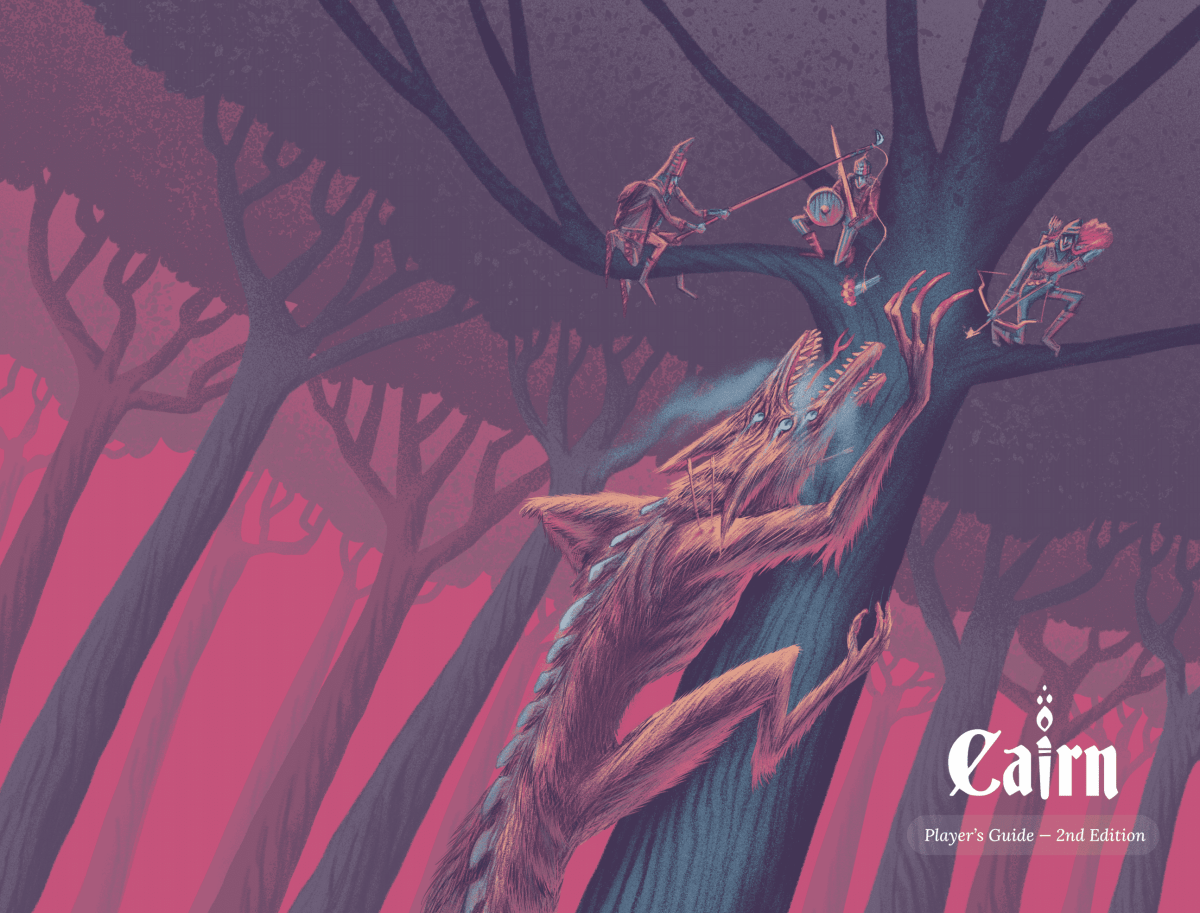SMOOSH JUICE
Rolling dice in Cairn vs D&D

I’ve been playing Cairn for eight sessions of Oz now. Cairn is a game that is very far from D&D: there aren’t any classes, and there aren’t any levels — all the character advancement comes through the story, through the acquisition of gold, items, friends, knowledge, and so forth. That is a challenge for someone like me who has mostly played games where classes and levels are Big Things and gold and items and friends and knowledge are all vehicles to Levels.
But there is another challenge, which is that in Cairn there are no ability checks, there are only saves, and this has caused us some difficulty, mostly in mindset. I’ve come to think of it this way:
In D&D you get to roll the dice, in Cairn, you have to roll the dice.
Checks versus Saves, Comparing the Rules
Now, on some level, checks and saves are essentially the same mechanic (in D&D 2024, it’s called the D20 Test). You roll, you try to beat a target number, you succeed or you fail.
And then we have the guidance from many games that you should only roll if the outcome is in doubt and the consequences are meaningful.
Here’s the 2024 Dungeon Master’s Guide for D&D 5th edition on the subject:
If the task is trivial or impossible, don’t bother with a D20 Test. A character can move across an empty room or drink from a flask without making a Dexterity check, whereas no lucky die roll will allow a character with an ordinary bow to hit the moon with an arrow. Call for a D20 Test only if there’s a chance of both success and failure and if there are meaningful consequences for failure.
Here’s Cairn 2e:
Avoid requiring a dice roll whenever possible… If a PC can solve a problem using purely narrative components, do not ask for a roll. When in doubt, ask whether the party has the time, resources, skills, or advantage to overcome a problem. If the answer is “no,” then a save is usually warranted. If the answer is “I don’t know,” then a roll with the Die of Fate may be necessary.
Note: the Die of Fate is a D6 used for determine random effects (high is good for PCs).
So it seems from these two descriptions that in some sense the rolls are functionally the same, even if some instances seem dubious (Lockpicking? I guess it’s save or leave the treasure behind).
I have found, however, that in play they are not the same. We roll *much* less in the Cairn game, and the way we roll doesn’t suit some players.
Examples
Imagine the thief Umber Silence sneaking into the Mastermind’s lair. In D&D the DM says. OK, roll a D20 and add your Stealth bonus — the DC is 15.
In Cairn, the situation is similar: The Mastermind is their lair, and Umber is most at risk. The Warden will say something like, “OK, make a DEX save or you risk being discovered the alarm being raised.” (Umber’s player thinks, oh heck, I don’t like that): “How about I peep around the corner with my mirror?” The Warden says, “Sure, you can do that, and lucky you did, because the alert guard has a clear view of your spot”.
Or Imagine Jockus Maximus the pit fighter. Jockus wants to pick his way across a hallway strewn with sharpened caltrops. In D&D this is a D20 Test of Dexterity. The DM asks Jockus to roll. Jockus just makes it and the DM describes how he nearly puts his big feet awry multiple times and only his stout boots and quick reflexes save him.
In Cairn, the Warden says: “Jockus, you can choose to pick your way across, risking damage,” following Cairn advice to be transparent about consequences. “Got any other ideas or do you want to roll?” Jockus: “Umm, isn’t there a board to the side here?” Warden: “Yes, it’s a construction site so there are lots of boards”. Jockus: “Good, can I lay one across the caltrops?” Warden: “Sure, you have plenty of time and the board is right there”. Jockus: “I do that”. Warden: “OK, you walk across”. The problem is solved narratively and Jockus goes on his merry way.
Issues
- Roll avoidance: What I’ve shown above are two situations where PCs *avoid* rolling because the specification of consequences of the save puts them off, and this happens, in my experience. They choose to use their environment and inventory instead, as designed. And that’s all well and good, but in some cases it sends players down a route of safety.
- Punished for success: Some players WANT to roll dice. So, if the player wants their character to climb a high rock, and they have time, and pitons, no save is necessary. And the better they are at playing, the less they roll. Since this player likes rolling dice, they feel punished for being good at the game.
- Calvinball: To the player who doesn’t roll very much (possibly because they are clever and cautious) it can feel like there are no rules and no checks on them at all, and they don’t like it. This is especially true for players who don’t like or are unfamiliar with narrative games.
- Pacing slows: Another thing that happens is that play can slow down as players consider all the possible ways to get out of a situation without rolling.
- Risky behaviour: Other players really enjoy this freedom, and push their characters into risky situations, enjoying how much they roll dice and both the successes and the failures (this happens in D&D too, of course, but in Cairn the PC is much more likely to die, which some players think is a bummer.)
Knowledge Rolls
There are a couple of situations in Cairn, where your character gets to roll, just like D&D, and this is usually about knowledge. Here the main difference is that the roll is gated by convincing the DM rather than by checking your character sheet.
Example (D&D): DM: “A big fish comes to the surface of the water. Anyone proficient in the Nature skill can roll to see if they know what it is. It’s an unusual fish so the DC is 15.”
Example (Cairn): “Do I know what this fish is?” Warden: “Why should you?” Player, “Uhhhh because I like fish.” Warden: “No, I don’t think that’s enough”. Second player: “I have a background as a sailor!” Warden: “OK, roll a d6. The higher you get, the more you know.”
I don’t think I have a greater point here, just that… it takes some getting used to on the part of both the DM and the players.
